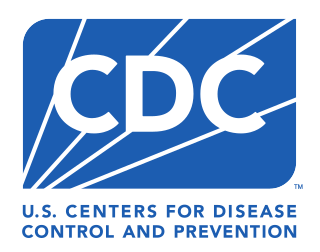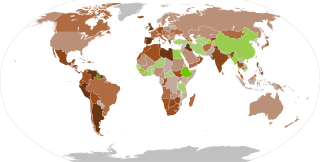
In response to the COVID-19 pandemic, the United States federal government and several U.S. states implemented moratoriums on eviction.

In response to the COVID-19 pandemic, the United States federal government and several U.S. states implemented moratoriums on eviction.
In March 2020, the United States Congress passed the CARES Act, which included a moratorium on the evictions of tenants in rental properties that receive federal funding or have federal government-backed mortgages until July 2020. [1]
The Centers for Disease Control and Prevention (CDC) announced an additional eviction moratorium on September 1, 2020, expected to last until December 31 of that year. [2] The order cited Section 361 of the Public Health Service Act, [lower-alpha 1] [3] which gives the agency authority to:
[...] provide for such inspection, fumigation, disinfection, sanitation, pest extermination, destruction of animals or articles found to be so infected or contaminated as to be sources of dangerous infection to human beings, and other measures, as in [the Surgeon General's] judgment may be necessary.
A challenge to the moratorium was filed in November by the Alabama Association of Realtors. In the District Court for D.C., Judge Dabney L. Friedrich ruled that the Public Health Service act did not give the CDC authority to enact moratoria on evictions. [4] Friedrich cited the rule of eiusdem generis , writing that evictions were too dissimilar from the other items listed in Section 361 to be covered under the phrase "and other measures." [5] On appeal, the Supreme Court voted 5–4, to maintain the moratorium. [6]
The Biden administration issued a new eviction moratorium on August 3, 2021, intended to last until October 3. [lower-alpha 2] [7] It was applicable to counties with substantial or high transmission rates of COVID-19. On August 26, the Supreme Court struck down the moratorium. [lower-alpha 3] [8]
43 U.S. states have implemented some form of an eviction moratorium during the COVID-19 pandemic; 27 of these states lifted their eviction moratoriums between May and September 2020. [9]
On June 28, 2021, Governor Newsom signed a bill passed by the California State Legislature extending eviction protections until September 30. [10]
In December 2020, the New York State Legislature passed a state moratorium on evictions. [11] In May 2021, the legislature extended the moratorium until August 31. [12]
The Supreme Court struck down a provision of the state moratorium that protected people who filed a form declaring economic hardship, rather than providing evidence in court. [13]

The Centers for Disease Control and Prevention (CDC) is the national public health agency of the United States. It is a United States federal agency under the Department of Health and Human Services, and is headquartered in Atlanta, Georgia.

Tara Kristen Lipinski is an American former competitive figure skater, actress, sports commentator, and documentary film producer. A former competitor in women's singles, she is the 1998 Olympic champion, the 1997 World champion, a two-time Champions Series Final champion (1997–1998) and the 1997 U.S. national champion. Until 2019, she was the youngest single skater to win a U.S. Nationals and the youngest to become an Olympic and World champion in figure skating history. She is the first woman to complete a triple loop-triple loop combination, her signature jump element, in competition. Starting in 1997, Lipinski had a rivalry with fellow skater Michelle Kwan, which was played up by the American press, and culminated when Lipinski won the gold medal at the 1998 Olympics in Nagano.

Janet Louise Yellen is an American economist serving as the 78th United States secretary of the treasury since January 26, 2021. She previously served as the 15th chair of the Federal Reserve from 2014 to 2018. She is the first woman to hold either post, and has also led the White House Council of Economic Advisers. Yellen is the Eugene E. and Catherine M. Trefethen Professor of Business Administration and Economics at the University of California, Berkeley.

Jones Day is an American multinational law firm based in Washington, D.C. As of 2023, it is one of the largest law firms in the United States with 2,302 attorneys, and among the highest grossing in the world with revenues of $2.5 billion. Originally headquartered in Cleveland, Ohio, Jones Day ranks first in both M&A league tables and the 2017 U.S. Law Firm Brand Index. The firm has represented over half of the companies in the Fortune 500, including Goldman Sachs, General Motors, McDonald's, and Bridgestone. Jones Day has also represented the campaign of former president Donald Trump.
A debt moratorium is a delay in the payment of debts or obligations. The term is generally used to refer to acts by national governments. Moratory laws are usually passed at times of special political or commercial stress: for instance, on several occasions during the Franco-Prussian War, the French government passed moratory laws. Their international validity was discussed at length, and was upheld in the English law case Rouquette v Overman (1875) LR 10 QB. Debt moratoriums are generally opposed by creditors.

Robert Ray Redfield Jr. is an American virologist who served as the Director of the U.S. Centers for Disease Control and Prevention and the Administrator of the Agency for Toxic Substances and Disease Registry from 2018 to 2021.

Stephen Kevin Bannon is an American media executive, political strategist, and former investment banker. He served as the White House's chief strategist for the first seven months of U.S. president Donald Trump's administration, before Trump discharged him. He is a former executive chairman of Breitbart News and previously served on the board of the now-defunct data-analytics firm Cambridge Analytica.

Dabney Langhorne Friedrich is an American attorney and jurist serving as a United States district court judge of the United States District Court for the District of Columbia. She previously served as a member of the United States Sentencing Commission.

Eviction in the United States refers to the pattern of tenant removal by landlords in the United States. In an eviction process, landlords forcibly remove tenants from their place of residence and reclaim the property. Landlords may decide to evict tenants who have failed to pay rent, violated lease terms, or possess an expired lease. Landlords may also choose not to renew a tenant's lease, however, this does not constitute an eviction. In the United States, eviction procedures, landlord rights, and tenant protections vary by state and locality. Historically, the United States has seen changes in domestic eviction rates during periods of major socio-political and economic turmoil—including the Great Depression, the 2008 Recession, and the COVID-19 pandemic. High eviction rates are driven by affordable housing shortages and rising housing costs. Across the United States, low-income and disadvantaged neighborhoods have disproportionately higher eviction rates. Certain demographics—including low income renters, Black and Hispanic renters, women, and people with children—are also at a greater risk of eviction. Additionally, eviction filings remain on renters' public records. This can make it more difficult for renters to access future housing, since most landlords will not rent to a tenant with a history of eviction. Eviction and housing instability are also linked to many negative health and life outcomes, including homelessness, poverty, and poor mental and physical health.
Emile Mosseri is an American composer, pianist, singer and producer based in Los Angeles. He has scored films including The Last Black Man in San Francisco (2019), Minari (2020), and Kajillionaire (2020), and composed for television shows like HBO's Random Acts of Flyness, and season 2 of Amazon's Homecoming. He received an Academy Award nomination for Best Original Score for his work in Minari. Mosseri is a member of the indie-rock band The Dig, as well as a recording artist and touring musician. He studied film scoring at Berklee College of Music. He is the younger brother of Adam Mosseri.

On December 31, 2019, China announced the discovery of a cluster of pneumonia cases in Wuhan. The first American case was reported on January 20, and President Donald Trump declared the U.S. outbreak a public health emergency on January 31. Restrictions were placed on flights arriving from China, but the initial U.S. response to the pandemic was otherwise slow, in terms of preparing the healthcare system, stopping other travel, and testing. The first known American deaths occurred in February. On March 6, 2020, Trump allocated $8.3 billion to fight the outbreak and declared a national emergency on March 13. The government also purchased large quantities of medical equipment, invoking the Defense Production Act of 1950 to assist. By mid-April, disaster declarations were made by all states and territories as they all had increasing cases. A second wave of infections began in June, following relaxed restrictions in several states, leading to daily cases surpassing 60,000. By mid-October, a third surge of cases began; there were over 200,000 new daily cases during parts of December 2020 and January 2021.

The first case of COVID-19 in the U.S. state of New York during the pandemic was confirmed on March 1, 2020, and the state quickly became an epicenter of the pandemic, with a record 12,274 new cases reported on April 4 and approximately 29,000 more deaths reported for the month of April than the same month in 2019. By April 10, New York had more confirmed cases than any country outside the US. As of August 11, 2023, the state has reported 131.3 million tests, with 6,722,301 cumulative cases, and 79,960 deaths.
The global COVID-19 pandemic struck the U.S. state of Wisconsin in early February 2020. Although Wisconsin has to date experienced 144 deaths per 100,000 residents, significantly fewer than the US national average of 196 deaths, COVID-19 was one of the three leading causes of death in Wisconsin in 2020. On August 25, 2021, Wisconsin public health authorities reported 7 day averages of 1,417 new cases and 236 probable cases per day, an increase of greater than 15 fold since late June 2021. This brings the cumulative total of COVID-19 cases in Wisconsin to 651,338. The state's death toll is 7,558, with 30 new deaths over the previous 7 days. As of August 25, 2021, 12.41% of Wisconsin's residents have been positively diagnosed with COVID-19, the 20th highest per-capita case rate among all US states. January 16's 128 COVID-19 deaths set a new single day record for Wisconsin.

The economic impact of the COVID-19 pandemic in the United States has been widely disruptive, adversely affecting travel, financial markets, employment, shipping, and other industries. The impacts can be attributed not just to government intervention to contain the virus, but also to consumer and business behavior to reduce exposure to and spread of the virus.

The wearing of non-medical face masks in public to lessen the transmission of COVID-19 in the United States was first recommended by the CDC on April 3, 2020, as supplemental to hygiene and appropriate social distancing. Throughout the pandemic, various states, counties, and municipalities have issued health orders requiring the wearing of non-medical face coverings — such as cloth masks — in spaces and businesses accessible to the public, especially when physical distancing is not possible.

The federal government of the United States initially responded to the COVID-19 pandemic in the country with various declarations of emergency, some of which led to travel and entry restrictions and the formation of the White House Coronavirus Task Force. As the pandemic progressed in the U.S. and globally, the U.S. government began issuing recommendations regarding the response by state and local governments, as well as social distancing measures and workplace hazard controls. State governments played a primary role in adopting policies to address the pandemic. Following the closure of most businesses throughout a number of U.S. states, President Donald Trump announced the mobilization of the National Guard in the most affected areas.

The COVID-19 pandemic in the United States has had far-reaching consequences in the country that go beyond the spread of the disease itself and efforts to quarantine it, including political, cultural, and social implications.

The CDC publishes official numbers of COVID-19 cases in the United States. The CDC estimates that, between February 2020 and September 2021, only 1 in 1.3 COVID-19 deaths were attributed to COVID-19. The true COVID-19 death toll in the United States would therefore be higher than official reports, as modeled by a paper published in The Lancet Regional Health – Americas. One way to estimate COVID-19 deaths that includes unconfirmed cases is to use the excess mortality, which is the overall number of deaths that exceed what would normally be expected. From March 1, 2020, through the end of 2020, there were 522,368 excess deaths in the United States, or 22.9% more deaths than would have been expected in that time period.

Rochelle Paula Walensky is an American physician-scientist who served as the director of the U.S. Centers for Disease Control and Prevention from 2021 to 2023 and served as the administrator of the Agency for Toxic Substances and Disease Registry in her capacity as the director of the U.S. Centers for Disease Control and Prevention from 2021 to 2023. On May 5, 2023, she announced her resignation, effective June 30, 2023. Prior to her appointment at the CDC, she had served as the chief of the Division of Infectious Diseases at Massachusetts General Hospital and a professor of medicine at Harvard Medical School. Walensky is an expert on HIV/AIDS.

Over the course of the COVID-19 pandemic, COVID-19 vaccine mandates have been enacted by numerous states and municipalities in the United States, and also by private entities. In September 2021, President Joe Biden announced that the federal government would take steps to mandate COVID-19 vaccination for certain entities under the authority of the federal government or federal agencies. Most federal mandates thus imposed were either overturned through litigation, or withdrawn by the administration, although a mandate on health care workers in institutions receiving Medicare and Medicaid funds was upheld. All federal mandates were lifted when the national emergency was declared to have ended in May 2023. A small number of states have gone in the opposite direction, through executive orders or legislation designed to limit vaccination mandates.